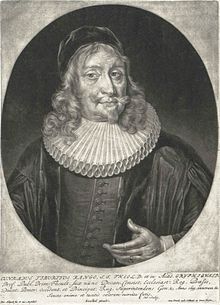Konrad Tiburtius Rango

Konrad Tiburtius Rango (born August 9, 1639 in Kolberg , † December 3, 1700 in Greifswald ; also Cunradus Tiburtius Rango ) was a theologian and naturalist . Rango was a well-known and avowed representative of Lutheran orthodoxy . In his time he was also known for his scientific, especially herbal research.
Life
The son of the Kolberger council chamberlain Joachim Range and his wife Sophia Heyse attended the grammar school in Halle from 1652 together with his brothers Lorenz and Martin . He then studied medicine at the University of Jena from 1654 to 1655 , but later switched to theology at the request of his parents . In 1655 he was enrolled at the University of Giessen together with his brothers . Together with his brothers in 1657 he went on a study trip through southern Germany and another to Holland and Brabant . On these trips he sought to meet well-known theologians of that time. The continuation of the journey to England was prevented by military unrest, so that he returned to Kolberg via the most important northern German cities in 1658. In 1659 he continued his studies at the University of Wittenberg , where he received his master's degree in the same year.
He then held a few lectures in Wittenberg until he moved to the Brandenburg University of Frankfurt in 1661 , where he also taught. Here he published several writings on biblical and secular-historical topics as well as on the Hebrew language . He turned down the offer of the Great Elector for a professorship at the philosophical faculty, combined with a deanery. Instead he went back to Wittenberg and from there on to Magdeburg , where Otto von Guericke was doing physical studies at the time. From 1663 to 1668 he was rector of the Berlin grammar school in the gray monastery .
In 1668 he was appointed to the Royal High School in Szczecin by the Chancellor of the Swedish Pomeranian Government. As an advocate of Protestant orthodoxy, he got into a dispute with the rector Andreas Gottfried Ammon , whom he accused of syncretism . After an unsuccessful attempt at arbitration, he had to resign his teaching post on the instructions of the government and was resigned from the diaconate at the Jakobi Church . During his tenure, Stettin was besieged in 1677 by the troops of the Great Elector, and the Jakobi Church was destroyed along with its library.
Together with the other Szczecin preachers, he accused the general superintendent of Swedish Pomerania , Augustinus Balthasar , of heresy. The reason was a church prayer that Balthasar had issued at the request of the Swedish government. Rango, Cramer and Friedrich Fabricius also attacked Ammon's successor as rector of the Carolinum, Johann Ernst von Pfuel . In addition to extensive correspondence, negotiations followed before the government and the Wismar tribunal , which only ended when Balthasar died in 1688 and Pfuel went to the Güstrow court.
He continued his polemics against Catholics and Reformed in theological writings. On the other hand, the Brandenburg court, which officially professed reformed doctrine, sued the Wismar Tribunal . However, there was no conviction of Rangos, who was able to prove the abuse of the Lutheran religion by Brandenburg scholars in a defense document and was protected by the Swedish King Charles XI. was standing.
In 1689 Rango, who had been pastor at Stettin Nikolaikirche since 1680 and received his doctorate in theology in Wittenberg in 1683 , was appointed to the general superintendant in Greifswald , which he held until the end of his life. Associated with the office was the professorship for theology at the University of Greifswald . He made sure that only strictly Lutheran clergy got into church offices. In addition, he secured the support of the Swedish government. Rango and his successor in office Johann Friedrich Mayer were largely responsible for the fact that Pietism could not gain a foothold either in Western Pomerania or at Greifswald University.
family
His older brother Martin von Rango was a lawyer, councilor in Kolberg and a local researcher. Konrad Tiburtius Rango married Dorothea Elisabeth Lorentz in 1666, the daughter of a preacher from Frankfurt / Oder. The marriage resulted in four sons and five daughters.
See also
literature
- Theodor Pyl : Rango, Konrad Tiburtius . In: Allgemeine Deutsche Biographie (ADB). Volume 27, Duncker & Humblot, Leipzig 1888, pp. 230-232.
- Lothar Noack, Jürgen Splett: Bio-bibliographies: Brandenburg scholars of the early modern period, Berlin – Cölln 1640–1688. In: Publications on Brandenburg's cultural history in the early modern period. Akademie Verlag, 1997, ISBN 978-3-05-002840-8 , pp. 317-332
Web links
- Literature about Konrad Tiburtius Rango in the Landesbibliographie MV
- Works by and about Konrad Tiburtius Rango in the German Digital Library
- Publications by and about Konrad Tiburtius Rango in VD 17 .
| predecessor | Office | successor |
|---|---|---|
| Augustine Balthasar |
General Superintendent of Swedish Pomerania 1689–1700 |
Johann Friedrich Mayer |
| predecessor | Office | successor |
|---|---|---|
| Heinrich Brandanus Gebhardi | Rector of the University of Greifswald 1693 |
Friedrich Gerdes |
| personal data | |
|---|---|
| SURNAME | Rango, Konrad Tiburtius |
| ALTERNATIVE NAMES | Rango, Conrad Tiburtius; Rango, Cunradus Tiburtius |
| BRIEF DESCRIPTION | German theologian and natural scientist |
| DATE OF BIRTH | August 9, 1639 |
| PLACE OF BIRTH | Kolberg |
| DATE OF DEATH | December 3, 1700 |
| Place of death | Greifswald |